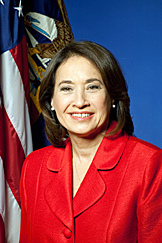by Caroline Dobuzinskis
IWPR was honored to have Sara Manzano-Díaz as keynote speaker at a launch event at the Woodrow Wilson Center for our latest report on immigration, Organizations Working with Latina Immigrants: Resources and Strategies for Change. We also had the opportunity to interview Ms. Manzano-Díaz, the Director of the Women’s Bureau at the U.S. Department of Labor (DOL), for this blog on her work championing for the rights of working women and for families.
Ms. Manzano-Díaz’s resume includes judicial, state, and federal titles: Deputy Secretary of State for Regulatory Programs at the Pennsylvania Department of State (appointed by Governor Edward G. Rendell), Deputy General Counsel for Civil Rights and Litigation at the U.S. Department of Housing and Urban Development, Assistant Attorney General in New York, and a Judicial Assistant and Pro Se Attorney in the New York State Judiciary. She also served as co-chair of The Forum of Executive Women’s Mentoring Committee, which mentors young professional women as they begin their careers, and participated in Madrinas, a program that provides mentors for at-risk Latina girls to encourage them to finish high school and attend college. Ms. Manzano-Díaz holds a Bachelor of Science degree in Public Relations and Communications from Boston University and a Juris Doctor degree from Rutgers University School of Law.
IWPR: Please tell me about your background: What led you to pursue a degree in law? What inspired you to pursue work in the civil service—specifically for women and families?
Sara Manzano-Díaz: Since the age of five I envisioned myself becoming a lawyer. Growing up in a Puerto Rican household, I became the family translator at a very young age. As a result, a love for advocacy grew from that experience. I became an advocate for my own family, which fueled a passion to advocate for all working families and women. Now, I represent 72 million working women as Director of the U. S. Department of Labor’s Women’s Bureau.
IWPR: What influence do you think the Women’s Bureau has on policy? How does it help to empower women?
SMD: When the law was passed in 1920 creating the office, the Women’s Bureau was given authority to formulate standards and policies that promote the welfare of wage-earning women, improve safety and working conditions, and advance their opportunities for profitable employment. One of the agency’s early achievements was the inclusion of women under the Fair Labor Standards Act of 1938, which, for the first time, set minimum wages and maximum working hours. As the advocate for women within the Labor Department, the agency was also instrumental in the development of the Family and Medical Leave Act, Pregnancy Discrimination Act and the Equal Pay Act.
In the 21st Century, our vision and the policy direction of the program still remains one of empowering all working women to achieve economic security. That translates into preparing them for high paying jobs, ensuring fair compensation, promoting workplace flexibility as well as helping homeless women veterans reintegrate into the workforce. Empowerment of women makes the world work and strengthens the American economy.
IWPR: What are your goals for the Women’s Bureau?
SMD: During my tenure, I want to see the Women’s Bureau continue to make a real difference in the lives of women of all races and to help families who have suffered in this economy. Our four priorities include: equal pay, workplace flexibility, higher paying jobs for women and assisting women veterans experiencing homeless. Lucrative jobs exist for women in the skilled trades, green sector and other non-traditional industries. Our goal is to link women to occupations in high-growth and emerging industries that can move them and their families into middle class status. Later this spring, we expect to publish a guide that links women to the green job sector nationwide. Another project will help Latino women, the fastest growing female population in America, achieve financial security through a financial literacy course in Spanish.
IWPR: The anniversary of Equal Pay Day will be on April 12th this year. How far do you think we have come since the 1963 passage of the Equal Pay Act? What do we have left to accomplish for gender equality?
SMD: Women continue to make great strides since passage of the Equal Pay Act of 1963. This administration supports the Pay Check Fairness Act and we are working hard every day towards economic security for women. In 1963 women earned $.59 on average for every dollar earned by men, today women earn $.81 on the dollar (based on the 2010 Census). As part of the President’s Equal Pay Taskforce, we are working to ensure that women have the tools to get fair pay in the workplace.
IWPR: You have had a very accomplished career. What do you consider your greatest achievement?
SMD: As an attorney, I have spent my career advocating for the voiceless. President Obama and [Secretary of Labor Hilda Solis] share that vision and passion to care for the most vulnerable members of society. I feel fortunate to have the opportunity to work for two historic individuals and know that the work we do will impact the lives of working class women and families. As Director of the Women’s Bureau, I get to advocate on a national scale and represent women of all ethnicities in the fight for their economic security, from rural women to single moms to homeless women veterans.
Caroline Dobuzinskis is the Communications Manager with the Institute for Women’s Policy Research.


